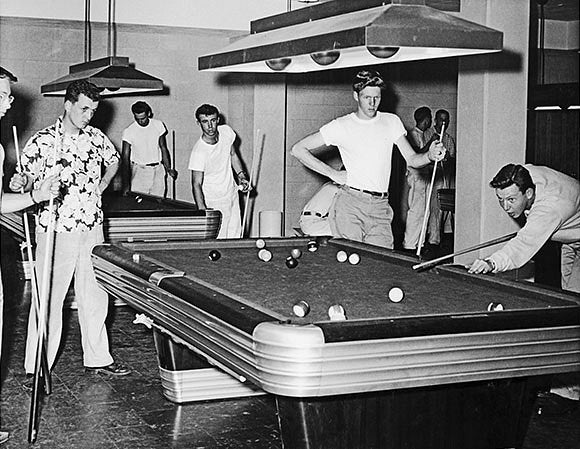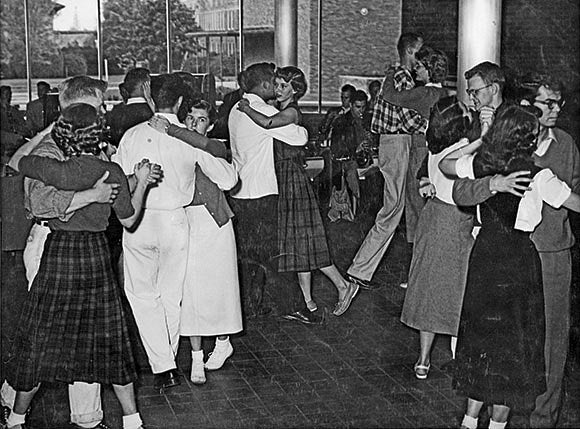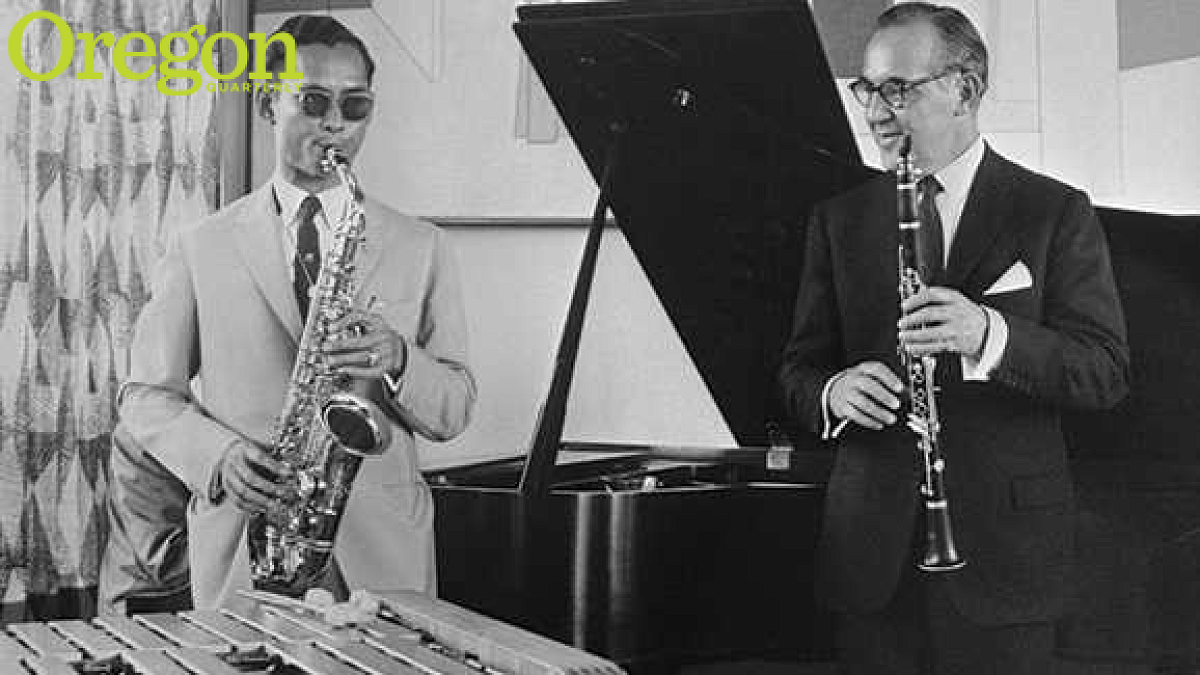The King and I
Sy Ellington hired me as assistant director of the EMU a couple years after I graduated from Oregon in 1954. Your feature on the EMU expansion (“A More Perfect Union,” Autumn 2014) brought back a flood of memories, none more vivid than the visit to our building by the king of Siam when he came to celebrate the University of Oregon’s adopting a sister university in his country.
The State Department sent a team to guide us through the protocol for the king’s visit, and I found myself playing a key role in the plan: I would operate the elevator, transporting the king and his entourage to the second-floor ballroom for the welcoming banquet (kings and presidents don’t do stairs).
The king’s party arrived through the north entrance, and I saw we had a problem with too many dignitaries and too little space in my small car. But we crammed everyone in (protocol calls for kings entering last) and the doors barely missed taking off the nose of the honored guest as I punched the button for the second floor. The overloaded car lurched upward, and then it didn’t.
Arrrggg! I had neglected to block off the mezzanine entrance, and someone had called the elevator from there. The doors slowly opened to reveal the “someone” as an elderly custodian in clothes that had seen many mop-ups, along with his wheel-can full of garbage.
The king and the custodian were standing eye-to-eye, literally just inches apart. With the exception of the king, all eyes turned to glare at me as I frantically jammed the “2” button. The king stared stoically ahead at the custodian, a royal dismiss of the intruder. It was a frozen time warp as the mechanical brain of the elevator digested the insistent messages from button 2. Then slowly, slowly the doors closed and the lift continued its mission to the second-floor ballroom. Another lift driver took my place for the king’s return.
Bill Landers, BS ’54
Milwaukie, Oregon
Carbon Problem
I hope that the lawsuit [described in “Natural Law,” Autumn 2014] succeeds, to compel the government to create a plan to reduce carbon emissions. However, reducing the current 402 parts per million (ppm) of atmospheric carbon to 350 ppm may not be feasible. “It is practically impossible to retrieve CO2 once it has been emitted. Much of it stays in the air more than 1,000 years,” according to scientist James Hansen, who was mentioned in the article. That’s grim news. But when you’re in a hole, the first step is to stop digging. Reducing carbon emissions is humanity’s first step.
Philip Ratcliff
Salem, Oregon
One very important point was not mentioned in the article: The US is only one of more than 200 nations in the world, and the only one that will obey the Supreme Court. The two most populous are China and India, and they have only recently become wealthy enough to follow the US in its century-long domination and overuse of the environment. Now that the US has discovered environmentalism, we have begun to pressure other nations to join us. China and India have both declined our offer, saying that they have every intention to have their century or so of environmental domination and overuse, and then they might join us as environmentalists. We likely have another century or so of environmental overuse ahead of us.
Harold Bailey, BS ’77, MS ’79
North Bend, Oregon
I went to the UO for four years and graduated in 1982. Now I live in the real world and am well aware of the fact that my university is a very liberal institution. If I may, I wanted to bring up some “inconvenient facts.” Global warming is based on computer models. These computer models have been consistently inaccurate. Most recently the computer models predicted a mild winter for the East Coast and Midwest. How did that work out? The false conclusions of this bogus science is killing jobs in our economy. For what? A theory that has no basis in reality. Common sense can tell the world is not warming, so the scientists that are being paid for this bogus science change the name to climate change. I just wish the university would tell both sides of the debate, instead of just the propaganda.
Dave Bowman, BS ’82
Corona del Mar, California
“Natural Law,” a piece on professor Mary Wood’s climate litigation scheme, presents an alarming rationalization for an end run around the will of the US electorate. While climate science is certain, the prescription for action is not. Courts are not bodies competent to craft sweeping prospective policy obligations absent a democratically attained mandate. No such mandate exists. Wood’s lack of faith in democracy is no reason to foist her climate prescription on society as a whole.
Ian Adams, JD ’13
Roseville, California
Alaska Memories
I, too, went to Alaska with my UO journalism training in 1980. During the two years I spent covering city council meetings, local school and community activities, and other interesting stories on the Last Frontier, I learned to drive in snow, to avoid moose on the road at midnight, and to see all sides of a controversy. Life in Alaska was difficult. I found the most independent, hardworking, and fun-loving people I’ve ever met, all of whom seemed to have gone to Alaska looking for something they lost in the Lower 48. Some of them are still searching for it, I suppose.
Aleta Zak, BA ’83
Marysville, California
Jessica Hollowell Thurman, in her otherwise excellent and moving essay “Pipe Dreams,” [Autumn 2014] despite (or perhaps because of) her history degree and journalism studies at Oregon, states: “. . . the drilling rigs are used to make a small number of men—not my dad—very, very rich.” [emphasis supplied] It took about 10 minutes to find that Prudhoe Bay is operated by BP for the benefit of itself, ExxonMobil, and ConocoPhillips Alaska (“Big Oil” in Thurman’s formulation). The largest shareholders in each of these corporations are the Vanguard Group of mutual funds (which, in turn, are owned by millions of small investors), Franklin Resources (another mutual fund company), and State Street, a large institutional investor. The largest individual investor listed for ExxonMobil is its CEO, Rex Tillerson, who owns less than 1 percent of the 237 million shares last reported to be owned by Vanguard. The days of John D. Rockefeller “owning” Standard Oil are long past, except, it seems, in the minds of the author and editors of Oregon Quarterly, who, one may hope, didn’t come to this wholly unsupported statement (no women have large positions in “Big Oil”?) as a result of their education at the University of Oregon.
Dean S. Kaufman, JD ’69
Cottage Grove, Oregon
Real Eugene
I have to say I take real issue with Larry Clack [“A New Low,” in “Letters,” Autumn 2014] about the essay “A Demolition” [published in the Summer 2014 issue]. I went back and reread it because I had remembered no “porn.” It shocks me that he would be so upset by a sad truth. Eugene, once a pristine little city (at least what I saw was), no longer is that. Yes, we have our bike trails and our trees and our businesses and our cafes . . . and certainly our university, but we have a pretty ugly underside of life here, too. And if this essay has gotten the attention of the more comfortable among us, I say, good for it.
Marjorie Harris, BS ’55
Eugene
In response to Larry Clack’s letter in the autumn issue, I would like to offer a different perspective. Just as Oregon Quarterly has the right and courage to publish the beautiful (nude) art photo, “Imogen and Twinka in Yosemite,” (page 23, Autumn 2014), the same is true regarding “A Demolition.”
Thankfully, Oregon Quarterly upholds a proud history at the UO that goes back maybe even further than the days of social upheaval and protest regarding the Vietnam War, a time when the student body and the community made its strong dissent known in no uncertain terms. As a middle school and junior high student, I remember following the antiwar demonstrations on TV, and eagerly reading the excellent, often strident reporting in the Daily Emerald, which was representative of the majority of UO students and voters in Eugene. I felt proud to be from Eugene and decided that I would someday attend the UO.
Apparently, Mr. Clack would rather see the approach taken by far too many comparably budgeted and produced university publications, which may as well be entitled Town & Country Lite. If something is a little edgy, but newsworthy, I am glad to see OQ err on the liberal side, as is our tradition at University of Oregon.
Phil Bevans, BS ’87
Portland, Oregon
Gottfredson’s Legacy
I disagree with the “Editor’s Note” in the Autumn OQ. Editor Ann Wiens assesses Michael Gottfredson’s short presidential tenure in a far too positive light. I have stayed active in UO matters since graduating, having served as president of the UO Law School Alumni Association, and on the board of the UO Alumni Association. I found President Gottfredson to be distant in dealing with the public, alumni, and donors.
I especially disagree with Wiens giving Gottfredson credit for bringing about “a long-sought change in governance structure.” That change was nearly fait accompli when Gottfredson arrived. The credit for the heavy lifting in bringing about the independent UO board goes to former presidents Dave Frohnmayer, Richard Lariviere, and interim president Robert Berdahl.
David Jensen, JD ’69
Vida, Oregon
EDITOR'S NOTE: Thanks to eagle-eyed readers, we have identified two individuals pictured in “A More Perfect Union” on pages 44–45 of the Autumn issue. Sherwood Snyder, MS ’59, points out “the handsome fellow in the floral shirt,” below left, as his theater mentor Faber Duchaine. Dick Blenkinsop, BS ’52, says his fraternity brother Rodger Eddy, BS ’52, appears on the far right in the photo below. We thank all the readers who shared EMU memories.




